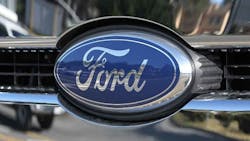Ford Still Plans to Move Some Production to Mexico
Ford Motor Co. (IW 500/4) still plans to relocate some production to Mexico despite the election of Donald Trump, who denounced the move and has threatened to impose hefty tariffs on car imports.
"We look forward to working with the new administration," Ford CEO Mark Fields said on Nov. 15. "Our plan is to move our Focus down to Mexico to make room for two very exciting products that will be coming down to the Michigan Center."
Speaking at the opening of the Los Angeles auto show, Fields said a 35% import duty on cars produced in Mexico, which Trump threatened during the campaign, would hurt the U.S. economy.
"A tariff like that would be imposed on the entire auto sector that could have a major impact on the U.S. economy.
"I continue to think that the right policies will prevail because we continue to share the same objective which is a healthy and vibrant U.S. economy."
Asked about the consequences of renegotiating or pulling out of free trade agreements such as NAFTA -- something Trump has pledged to do -- Fields said Ford remains "a big supporter of free and fair trade" but added: "We'll see how things play out."
His remarks echoed those made by BMW chief Harald Krueger in the wake of the real estate tycoon's surprise election last week.
Fields said of Trump, "We look forward to working with him to consolidate the U.S. economy."
Ford will continue to advocate for policies on currency manipulation and fuel standards that are "in line with market realities," as well as tax reform and "the safe adoption of autonomous cars."
During the bitter campaign for the White house, Trump criticized American companies for relocating production abroad. Computer giant Apple has been one of his main targets.
Ford in early April unveiled a $1.6 billion investment in a new facility in Mexico, where the workforce is very cheap compared to the United States. The plant will be operational in 2018.
Car companies that move U.S. factories offshore have become a frequent target of politicians and local elected officials, not least because General Motors and Chrysler -- although not Ford -- were saved from bankruptcy in 2009 with a government bailout.
Jessica Caldwell, an analyst at the Edmunds.com automotive website, the most immediate challenge created by a Trump administration, even more so than the renegotiation of international trade agreements, is to question government subsidies on electric cars.
Trump, who has denied the existence of climate change in the past, suggested during his campaign that he would close the US Environmental Protection Agency (EPA), and his government may decide to eliminate federal incentives for the purchase green cars.
"The big concern now is the government subsidies for green cars," she says, adding that the manufacturers have spent tens of millions of dollars to reduce gasoline consumption and polluting emissions.
Copyright Agence France-Presse, 2016
About the Author
Agence France-Presse
Copyright Agence France-Presse, 2002-2025. AFP text, photos, graphics and logos shall not be reproduced, published, broadcast, rewritten for broadcast or publication or redistributed directly or indirectly in any medium. AFP shall not be held liable for any delays, inaccuracies, errors or omissions in any AFP content, or for any actions taken in consequence.
